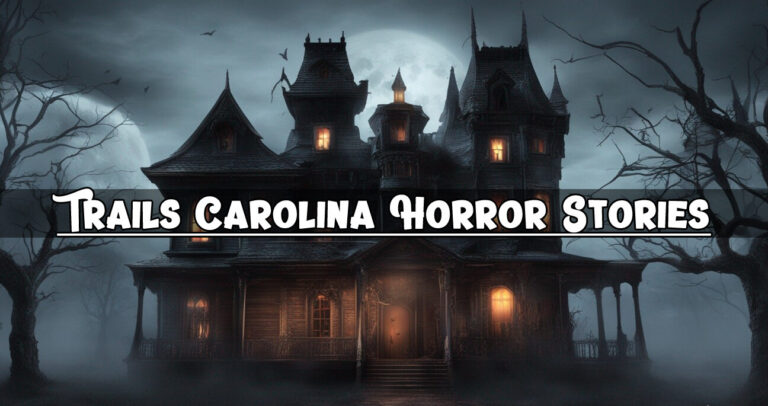Introduction
In the heart of the picturesque landscapes of North Carolina lies Trails Carolina, an institution known for its wilderness therapy programs, however, beneath the serene exterior lurk unsettling tales that have caught the public’s attention.
These are the Trails Carolina Horror Stories, narratives that paint a different picture of the wilderness therapy experience. This human-written article aims to delve deep into these stories, uncovering facts and exploring the nuances of the experiences recounted by former participants and their families.
The Birth of Trails Carolina
Trails Carolina was established with the intent of helping troubled teens find their path in life through a combination of nature, therapy, and education.
Wilderness therapy is not new, and Trails Carolina embraced this therapeutic approach with open arms. However, as time progressed, whispers of darker experiences began to surface.
Unearthing the Horror Stories
The term “Trails Carolina Horror Stories” began circulating through hushed conversations among concerned parents and later across various internet platforms.
These accounts range from allegations of psychological trauma to physical hardships that far exceeded therapeutic intentions. Some former attendees describe their time at Trails Carolina as one of the most challenging periods of their lives, marked by fear, discomfort, and a sense of helplessness.
Psychological Impact
A significant component of the horror stories revolves around the alleged psychological impact of the program. Reports of extreme isolation, harsh disciplinary methods, and a one-size-fits-all approach to therapy have been shared.
These narratives often highlight a lack of personalised care and an environment that, instead of fostering growth and healing, perpetuated a sense of trauma and distress.
Physical Challenges
Beyond the psychological aspects, the physical demands placed on attendees have also been a point of contention. Stories of gruelling hikes, insufficient food, and exposure to harsh weather conditions without proper gear paint a bleak picture of the wilderness experience.
While the ethos of wilderness therapy often includes overcoming physical challenges, the accounts suggest a boundary where therapeutic challenges cross into the realm of endangerment.
The Response from Trails Carolina
Trails Carolina has responded to these allegations, often highlighting their program’s positive outcomes and successes. They emphasise their commitment to safety, the professionalism of their staff, and the tailored approach they claim to offer each participant.
The organisation stresses the importance of context and perspective when considering these horror stories, suggesting that the shared experiences do not represent the program’s reality for most of its participants.
Investigating the Claims
An in-depth investigation into these horror stories involves scrutinising the accounts, understanding the wilderness therapy industry, and examining the regulatory framework governing such institutions. This includes interviews with former participants, discussions with mental health professionals, and analysis of any available inspection and compliance reports.
Former Participants’ Perspectives
The heart of this investigation lies in the stories of those who lived through the program. Their firsthand accounts provide crucial insights into the daily realities of Trails Carolina. It is essential to approach these narratives openly, recognising the subjectivity inherent in personal experiences while seeking patterns and commonalities that indicate systemic issues.
Mental Health Professionals’ Analysis
Mental health professionals can offer an informed perspective on the therapeutic modalities used at Trails Carolina. They can show whether the practices align with accepted therapeutic standards and the potential psychological effects of such wilderness programs.
Regulatory Oversight
Understanding the level of regulatory oversight and compliance with state and federal guidelines is crucial in evaluating the legitimacy and safety of Trails Carolina’s operations. This examination helps ascertain whether the horror stories stem from a lack of regulation or enforcement or are anomalies in an otherwise well-regulated system.
The Larger Picture
The Trails Carolina Horror Stories cannot be viewed in isolation. They are part of a broader conversation about the efficacy and ethics of wilderness therapy programs. This includes examining the industry’s history, the diversity of programs available, and the ongoing debate among experts about the best practices in treating troubled youth.
Industry Standards and Practices
The wilderness therapy industry has standards and practices that vary significantly among different programs. Understanding these variations is critical to discerning the specific issues at Trails Carolina. It involves exploring how these standards are developed, who enforces them, and the role of accreditation bodies in ensuring program quality and safety.
Ethical Considerations
The ethical implications of such therapy programs, especially those involving minors, are vast and complex. This includes the consent process, the rights of the participants, and the balance between therapeutic intervention and personal autonomy.
Conclusion
Like many wilderness therapy programs, Trails Carolina exists in a realm where transformative experiences and challenging ordeals coexist. The Trails Carolina Horror Stories highlight the need for a thorough investigation, stringent regulation, and ongoing dialogue about the best practices in wilderness therapy.
As we continue to unveil the darkness and bring these stories into the light, it is imperative to approach them with empathy, a critical eye, and a commitment to understanding the truth.


